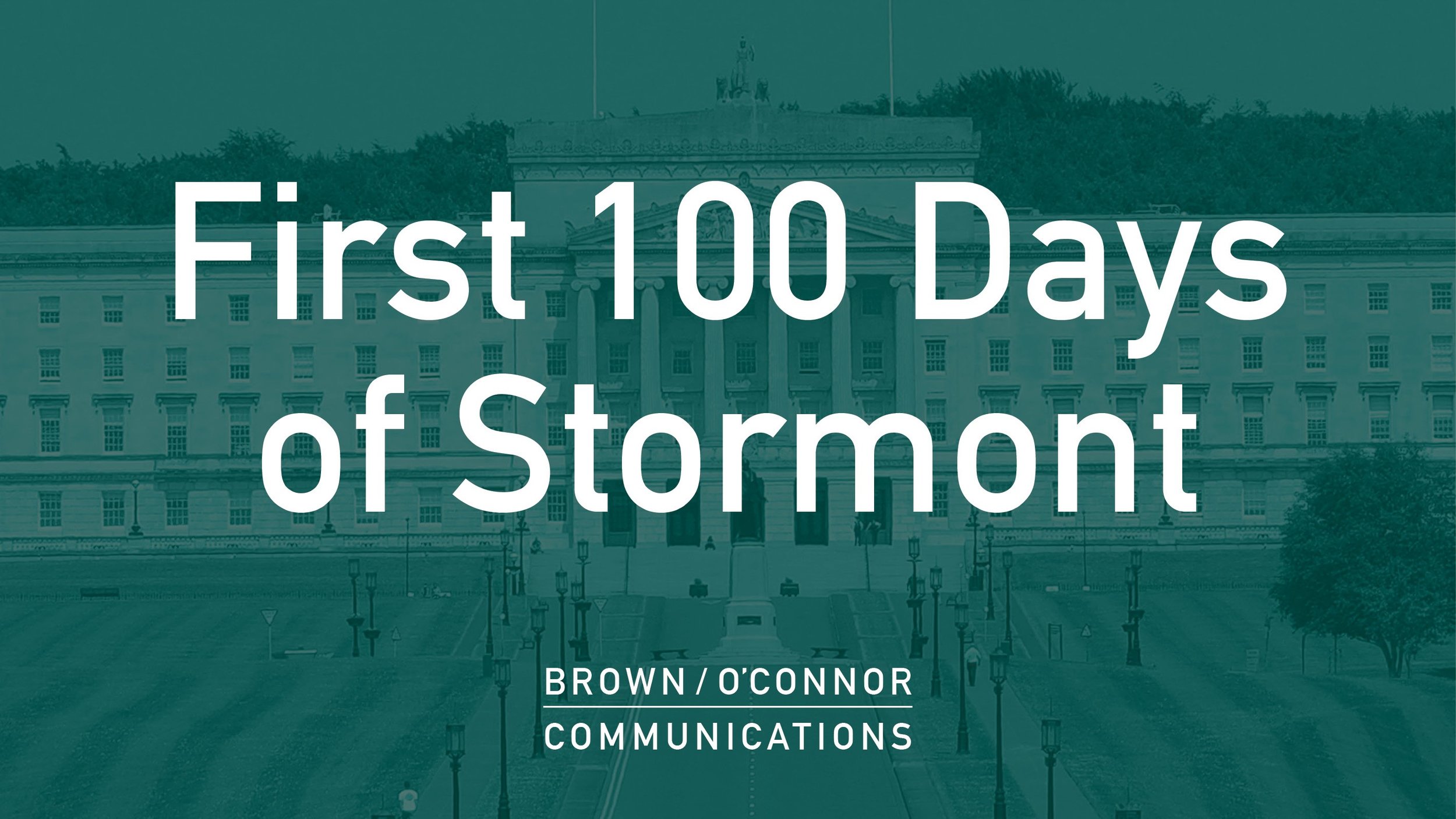Position: CLIENT MANAGER (PUBLIC AFFAIRS)
Experience: Min 3+ years
Area: Public Affairs & Strategic Communications
Salary: £42k - £45k
Based: Adelaide Street, Belfast City Centre
About Brown O’Connor Communications
Brown O’Connor Communications is one of Ireland’s most trusted and respected communications advisory firms.
Specialist in Public Affairs, Corporate Media Relations, Issues Management & Crisis Communications, the agency was awarded the CIPR Best Public Affairs Campaign 2022/2023 and was named the Chartered Institute of Public Relations Northern Ireland Consultancy of the Year (Small) 2021/2022.
We have a track record for managing and delivering complex public affairs programmes for some of the UK and Ireland’s leading businesses, professional services, charities, trade bodies, interest groups and public-sector organisations.
We help our clients gain impact and outcomes through specialist insight and influence with editors, government ministers and corporate decision makers.
We are trusted advisors based on our:
Extensive experience working for high-profile, public facing organisations and delivering our services on a range of sensitive issues.
Credibility through the people who make up our team and the approach they take.
Clients who provide endorsement on the reliability and professionalism of our work.
Our Location
Our central office is based in Belfast City Centre managing clients based in Northern Ireland, London, Dublin and the US.
Our Specialist Areas
We are highly regarded for our specialist Public Affairs and Corporate and Strategic Communications services which includes Crisis Communications, Property and Planning Communications, Litigation Communications, Event Management, Political Monitoring and Communication Strategy Development.
Our Clients
Our consultants work across a range of areas including legal, commercial, financial, financial technology, industrial, manufacturing, public inquiries, regulators, commissions, non-departmental public bodies and the third sector.
Our Approach and Company Culture
The success of Brown O’Connor Communications is based on the performance of its people.
Our rigorous approach delivers positive outcomes for our clients, and we go out of our way to ensure success.
We deliver excellence in all that we do and our team is accountable and responsible for all activity they undertake.
What we offer
22 Days Annual Leave and 11 Public Holidays
Flexible working 1 day per week (Friday)
Paid Annual CIPR Membership
An exciting and dynamic working environment in a city centre-based office
Training opportunities
Mobile Phone allowance
Regular team social events
The Person
Brown O’Connor Communications is seeking a talented and ambitious Client Manager (Public Affairs) to join the team.
This is an exciting and demanding role within a leading consultancy and requires a resilient individual with demonstrable client management and leadership ability.
You may be already working in public affairs or corporate communications in an agency; as an in-house communications manager; in politics; or as journalist.
You will have a deep professional interest in business, the media and politics and have a detailed understanding of the role that media relations, public affairs, and stakeholder relations plays.
Role Specification
Strategic Counsel
Proven client handling skills with experience in managing large accounts, providing proactive strategic advice.
Ability to manage a high level of client interaction and be able to design and implement strategies.
Day to Day Delivery
Proven ability to work in a fast paced, often pressurised, outcome orientated environment.
Create and manage lobbying campaigns securing policy change, legislative change and the smooth running of political engagement programmes.
Oversee the delivery of the Brown O’Connor Communications political monitoring services.
Manage and lead the forward work programmes of All-Party Groups at the NI Assembly.
Devise and manage pre-application community consultations for important planning applications.
Write strong editorial content on behalf of clients including press releases, opinion/platform pieces and blogs and ensure coverage across a range of media outlets.
Manage an entire range of suppliers such as photographers, graphic designers, videographers, economists and sectoral experts integral to the successful delivery of client activity campaigns.
Manage public awareness campaigns integrating various methods to create significant public interest.
Be able to create engaging social media content across multiple platforms.
Forward plan to ensure smooth running of client campaigns on time, and within budget.
New Business Development
Take a leading role in new business development and organic growth opportunities alongside company directors and be comfortable in pitching and proposal development.
Supporting successful tender writing from start to submission.
Experience in identifying and converting new business opportunities.
People Management
Line management duties with wider members of team.
Understanding the requirement to work with efficiency and profitably.
Manage team members on client accounts to ensure work is carried out successfully and within allocated budgets.
Work as a team player with Brown O’Connor colleagues to ensure success across client accounts.
Deliver outcomes for clients and work to raise their profile in the media and with key stakeholders in a positive way.
Criteria
3+ years working in the areas of Public Affairs and/or Corporate/Strategic Communications or within a communications environment (Agency experience preferred).
Third Level Degree or equivalent in the preferred areas of Communications, Law, Politics, Business, Social Science or Humanities.
Possess strong writing and editing skills with ability to write attention-grabbing media material, client correspondence and reports.
An excellent communicator both written and oral.
Commercially and politically aware.
Outstanding organisational skills and ability to manage multiple projects at the same time.
Strong initiative, leadership skills and work ethic.
Ability to hustle to make things happen.
Willingness to work evenings and weekends as required by client and other activity.
Clean driving licence and access to a car is a must due to client requirements.
Desirable Criteria
Experience in working in a similar role in the Republic of Ireland.
How to Apply
To apply in strict confidence, please send your detailed CV, covering email and the completed response to the set question below, by email, to Brown O’Connor Communications at hello@brownoconnor.com by 5pm Monday 3rd June 2024
QUESTION: Please outline, with examples, how you meet the Criteria as outlined in the Job Specification (Word Limit 300).
Please state your name and ‘CM Public Affairs’ in the subject line.
Application Process
· Initial shortlisting
· Two stage interview











